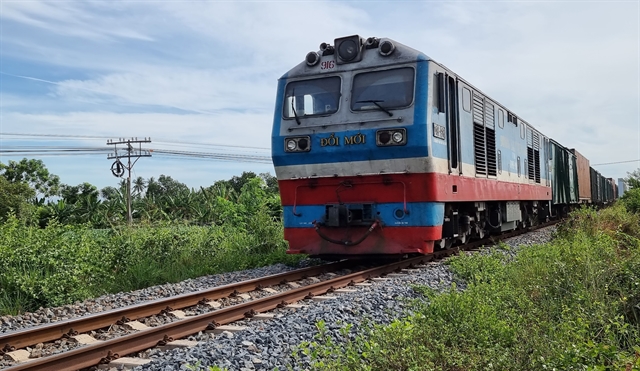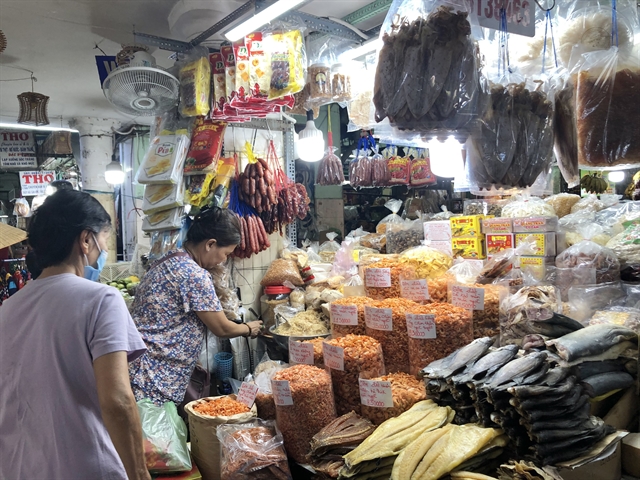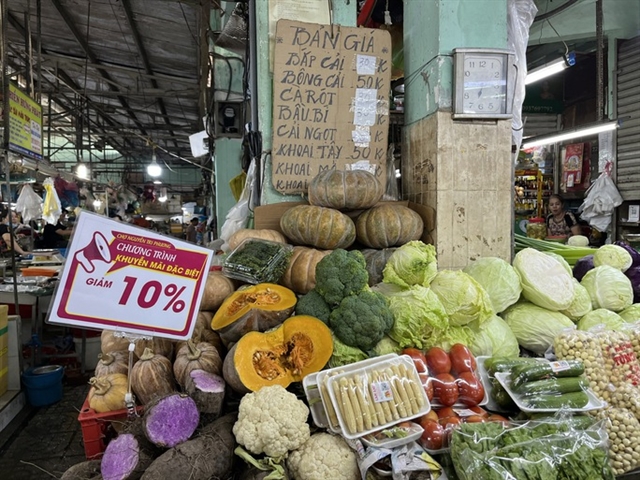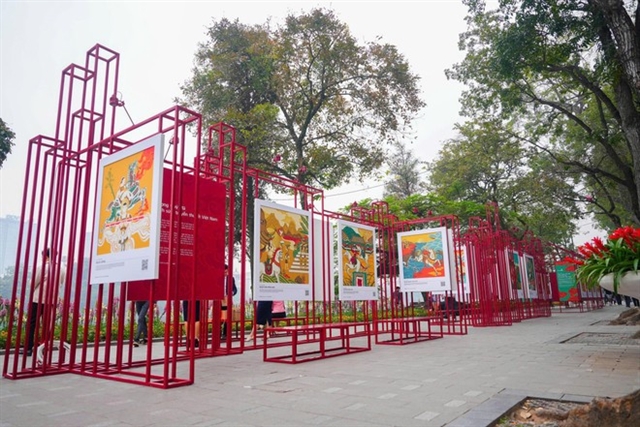 Economy
Economy

 |
| A stall selling dried seafood at Nguyễn Tri Phương Market in District 10 lists the price of products clearly to ensure shoppers feel secure. — VNS Photo |
HCM CITY — Vendors at many traditional markets in HCM City, in a bid to attract customers, have been offering discounts, selling online and accepting cashless payment.
Recently more than 100 of them at Nguyễn Tri Phương Market in District 10, including those selling fresh foods, cosmetics, footwear, and clothes, participated in the first phase (ending July 15) of the city’s 2023 "Shopping Season" promotion programme by offering discounts of 5-20 per cent, even 50 per cent, on many products and saw sales skyrocket.
"The number of visitors to the market increased by 30 per cent compared to before the programme and by 70-80 per cent compared to just after COVID-19,” Đàm Vân, deputy head of the market’s management, said.
“Vegetable, meat and fish stalls offering promotions were always sold out, and traders were very happy."
Trần Thị Ánh Thu, a trader, said after COVID demand was very weak, especially for non-essential goods, as people tightening their purse strings amid a difficult economic situation.
The promotions saw the number of customers at her shop go up by 50 per cent from normal times, she said.
Nguyễn Thị Thanh Thúy, owner of a stall selling dried seafood, said: “Thanks to the programme, I have got more new customers. Crowds have brought a lot of vitality to the market.”
Vân said the market management and traders organise promotions on occasions such as International Women's Day (March 8), Vietnamese Family Day (June 28) and National Day (September 2).
“Going forward, the market management plans to organise quarterly promotions and encourage small traders to participate in them to bring more customers.
“The market also plans to upgrade toilets and other facilities to become cleaner and cooler to attract more customers.”
Similarly, traders at markets like Bến Thành (District 1), Xóm Chiếu (District 4), Bình Thới (District 11), and Bà Chiểu (Bình Thạnh District) have offered promotions and given gifts to attract customers. To add convenience, they accepted payments via QR codes and POS machines and sold their products via Facebook and Zalo, making home deliveries.
Trang, a vegetable seller at Đa Kao Market in District 1, said: “I sell both directly at the market and online, and the prices are the same. I also co-operate with many other small traders to sell other products, which makes it convenient for customers and saves delivery costs.”
Thanks to this, she regularly sells out within a day, she said.
Nguyễn Thành Châu, head of the Thái Bình Market management board, said most shops have wifi and connect online with customers and deliver goods to their homes.
“Goods prices are listed clearly, which is also an important factor in retaining customers."
Reform to survive
 |
| Vendors at many traditional markets in HCM City, in a bid to attract customers, have been offering discounts, selling online and accepting cashless payment. — VNS Photo |
According to experts, traditional markets are not only a place to buy and sell fresh goods, but also an inherent part of local culture.
But nowadays, most customers at these markets are older people, and young people rarely buy there for fear of being overcharged and their less modern appearance, they said.
The rise in online shopping has also hit traditional markets, they said.
The managements of many traditional markets in the city said traders are struggling with poor sales and many have opted to close down.
This requires merchants to embrace new consumer trends to survive, the experts said, while traditional markets need to upgrade themselves to offer more comfort and convenience to shoppers.
Economist Dr Huỳnh Thanh Điền said traditional markets with historical and cultural significance such as Bến Thành and Bình Tây need to be preserved to serve as tourist icons.
But others need to be converted into mini supermarkets with their merchants trained to sell goods online, he said.
Nguyễn Nguyên Phương, deputy director of the city Department of Industry and Trade, said there are 232 traditional markets, all established long ago along with residential quarters.
But most have deteriorated and lack public facilities, wastewater treatment systems, sufficient storage space, and standard business areas, he said.
The department has recommended that the city People's Council consider supportive mechanisms and funding to renovate and upgrade them, he said.
Châu of Thái Bình Market said: “Sales at the market remain sluggish, and so the management has called on authorities to support small traders with fee and tax breaks.
"It is trying to improve the market’s looks and rearrange stalls to make them more eye-catching,” — VNS




